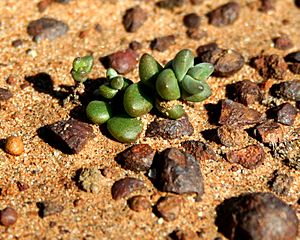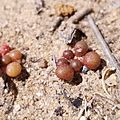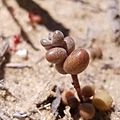Short-leaved liveforever facts for kids
Quick facts for kids Dudleya brevifolia(Dudleya blochmaniae subsp. brevifolia) |
|
|---|---|
 |
|
| Scientific classification | |
| Genus: |
Dudleya
|
| Species: |
brevifolia
|
| Synonyms | |
|
Dudleya blochmaniae subsp. brevifolia Moran |
|
Dudleya brevifolia, also known as the short-leaved liveforever or short-leaved dudleya, is a very rare succulent plant. Succulents are plants that store water in their leaves, stems, or roots, like cacti. This special plant used to be considered a type of Dudleya blochmaniae, but now it's recognized as its own unique species.
Contents
Where Does This Plant Live?
This unique plant is only found in a very small area of southern California. It lives in coastal sage scrub habitats, which are areas near the coast with specific types of shrubs and plants. You can find it in southwestern San Diego County.
It grows in places like Torrey Pines State Reserve in La Jolla, and in several spots in Del Mar. Both of these places are coastal towns in San Diego County.
This plant prefers to grow on bare, hard surfaces made of Torrey sandstone. These spots have very little topsoil. It's usually found at elevations from about 100 to 820 feet (30 to 250 meters) above sea level. Small, marble-sized, iron-rich bits are always found where it grows. These bits are likely important for the plant's health.
What Does This Plant Look Like?
Dudleya brevifolia is a small plant, usually only 0.4 to 1.6 inches (1 to 4 cm) tall. It's a bit like a hidden, corm-shaped succulent. A corm is a short, underground plant stem that stores food. This plant is a perennial, meaning it lives for more than two years.
It has cone-shaped leaves that grow along its stem, which is often hidden. The plant can be brown, reddish-purple, or greenish. It starts to grow after good winter rains, usually from December to February.
Flowers and Seeds
The plant produces a branching flower stalk, called an inflorescence. Each branch has a few flowers. Each flower opens up into a star shape with five pointed petals. This plant blooms from April to June.
After flowering, the plant makes a fruit with many seeds. The seeds are spread from a single opening in the fruit.
Why Is This Plant Important?
The number of these plants changes a lot depending on how much rain there is. Their population explodes when there's more than 10 inches of rain each year. But it shrinks a lot when there's less than 4 inches of rain.
This plant is seriously threatened by things like new buildings (urbanization), cars, people walking on it, and the creation of fire breaks. Fire breaks are clear areas made to stop fires from spreading.
Scientists have done many studies on the population of this plant. For example, on Carmel Mountain in San Diego, there were only about 1,446 plants in 2002. But in 2006, the number jumped to over 113,000! In 2008, other researchers estimated over 100,000 plants there.
Dudleya brevifolia is a high priority for conservation. This is because it only lives in five known locations. These are Torrey Pines State Reserve, Carmel Mountain, Crest Canyon, Skeletal Canyon, and Torrey Pines Extension. The total area where this plant lives outside of Torrey Pines State Reserve is very small, estimated at only about 2,667 square meters.
Endangered Species
Because it's so rare and threatened, Dudleya brevifolia is listed as an endangered species by the state of California. The California Native Plant Society also lists it as endangered.
The U.S. Fish and Wildlife Service listed it as endangered in January 1982. However, in October 1996, they removed its federal protection. They said the threats had lessened and that the plant was protected by the Multiple Species Conservation Program (MSCP) in southern San Diego County.
Images for kids






